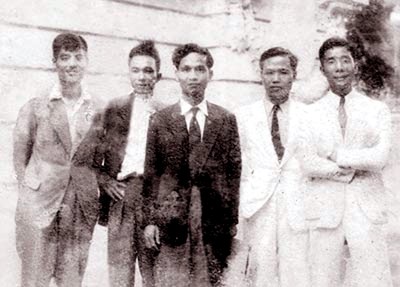August Revolution marked a milestone in Vietnamese poetry
(VOVworld) - The 1945 August Revolution ended 80 years of colonial domination and opened a new era of freedom and independence for Vietnam. It was also a moment of rebirth for many national cultural and spiritual values and signaled a new development period for Vietnamese literature and poetry.
Vietnamese literature and poetry entered a new development period after the success of the August Revolution. Researcher Đặng Thai Mai said of this period: “A new style of literature and poetry appeared. The sacrifices of fallen soldiers and the strong national spirit of self-esteem were a common topic of literary and poetry works at that time.” The new national spirit became a major source of inspiration for poets all over Vietnam. Doctor Lưu Khánh Thơ of the Vietnam Literature Institute told VOV:
"In addition to opening a new era for the nation, the August Revolution marked a milestone in Vietnamese literature, especially in poetry. Different writers and poets all shared a common inspiration from the revolution at that time. This was a very significant change in our country’s literature."
This change was clearly reflected in a series of literary works then. Poet Lê Thanh Nghị, President of the Council for Theories and Criticism of the Vietnam Writers Association, said:
"During this period, all writers and poets, regardless of their styles, origins, or interests, united in the revolution for national independence. If literary works during the period from 1930 to1945 focused on individual emotional feelings and love, those during the revolutionary period focused on each person’s responsibility to the nation’s future, calling on people from all social strata to join hands in the fight against the French colonialists. Most literary works during this time were written in an epic style."
Poet Tố Hữu was the first to express the boundless joy of the Vietnamese people on the country’s Independence Day in his poetry collection called “From that moment on”. Tố Hữu’s poems were always associated with the revolution, according to Lưu Khánh Thơ:
"Tố Hữu was a very sensitive poet who was able to capture every development of the revolution and feature them in his poems. His poem “From that moment on” goes: ‘From that moment on my heart is full of sunshine. The sun of truth brightens every corner of my heart.’ Upon the success of the 1945 August Revolution, he composed another poem “Hue in August”, using the symbols of sun and heart to illustrate the Vietnamese people’s pride and happiness at ending colonialism and beginning a new era of independence and freedom."
 |
Poets Thoi Hieu, Nguyen Dinh Thi, Xuan Dieu, Huy Can, Nguyen Huy Tuong in Hanoi in 1946. (Photo; internet)
|
Romantic writers and poets found in the revolution not only a new life for the nation and its people, but a new life for their artistic career. Ms. Lưu Khánh Thơ again:
"Tố Hữu and Xuân Diệu are the most outstanding poets of Vietnamese poetry. Xuân Diệu is praised as the king of love poems, whose pre-revolution poetry collections mostly delved into love, the human ego, and himself. His poems “The national flag” and “The national conference” were released shortly after the August Revolution. In them Xuân Diệu honored the red flag with the central yellow star as the country’s revered symbol. The images, language, emotions, and awareness of the nation and revolution he put into these two poems were totally new and can’t be found in his pre-revolution works."
Despite writing in different genres, Xuân Diệu and Tố Hữu shared many similarities in their use of images to express their emotions. This is attributable to the August Revolution, which became a source of inspiration evoking the poets’ restless creativity. Poet Lê Thanh Nghị again:
"The August Revolution has left an indelible mark of national patriotism on many poems of that period. The poems are composed using strong, rapid rhythms and sentences of flexible length, reflecting the strength and spirit of soldiers on the battlefield."
The August Revolution brought a clean slate to Vietnamese poetry, which began honoring the epic resistance of the Vietnamese people in the Ho Chi Minh era.
Lan Anh